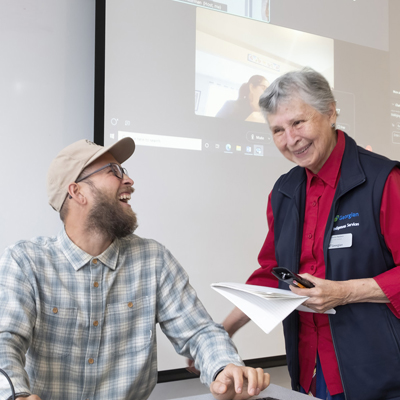
Instructional Coaching
Instructional coaching is a collaborative, supportive, non-evaluative partnership between experienced educators (CTL coaches) and faculty with the primary goal to enhance teaching practices, thereby improving student learning outcomes and fostering a culture of continuous professional development among teachers.
Key components
Collaborative Partnership
- Instructional coaching is built on a foundation of trust and mutual respect. Coaches work alongside faculty members, not as evaluators, but as partners focused on shared goals.
- The relationship is non-evaluative, emphasizing support and growth rather than judgement.
Personalized Professional Development
- Each coaching relationship is tailored to the individual needs and goals of the faculty member.
- Coaches help faculty identify specific areas for improvement and develop actionable strategies to address them.
Evidence-Based Practices
- Coaches utilize evidence-based instructional strategies and methods to guide their support.
- The focus is on implementing proven techniques that enhance teaching effectiveness and student engagement.
Classroom Observations and Feedback
- Coaches may observe classroom sessions, either in-person or through video recordings, to gather insights on teaching practices in a non-evaluative manner.
- Constructive, specific feedback is provided to help faculty refine their techniques and strategies.
Goal setting and Action Planning
- Together, coaches and faculty members set clear, achievable goals for improving instruction.
- Action plans are developed to guide the implementation of new strategies and practices.
Ongoing Support and Reflection
- Coaching is a formalized iterative process involving regular check-ins, reflections, and adjustments.
- Continuous support helps faculty members stay motivated and on track toward achieving their goals.
Benefits of an Instructional Coaching program
- Sustaining and Enhancing Quality Education:
- It is important to attract and retain quality teachers and invest in and focus on quality education. Instructional coaching helps ensure that this investment translates into tangible improvements in teaching and learning.
- Coaches work with faculty to integrate innovative, research-based instructional methods that can enhance the overall quality of education.
- Building a Culture of Continuous Improvement:
- An instructional coaching program offers the resources and stability needed to foster a culture of continuous improvement. Instructional coaching creates spaces for reflection and growth, allowing educators to refine their practices and stay current with educational advancements (Kaufman, 2022).
- By promoting a mindset of ongoing professional development, coaching helps institutions stay ahead in a competitive educational landscape.
- Maximizing Resources:
- Working with all relevant Georgian College departments, instructional coaches can help faculty members utilize available teaching and learning resources more efficiently, ensuring that investments in technology, curriculum development, and other areas yield maximum benefits.
- Fostering Innovation and Creativity:
- Instructional coaches can promote innovation and experimentation with new teaching strategies and technologies. In a supportive manner, instructional coaches encourage faculty to explore and implement innovative approaches in their classrooms, fostering a climate of creativity and forward-thinking.
- Coaches support the integration of progressive educational technologies and methodologies, ensuring that the institution remains at the forefront of educational innovation.
- Supporting Faculty Well-Being and Retention:
- Instructional coaching contributes to faculty well-being by providing personalized support and professional growth opportunities which can decrease feelings of isolation and increase a sense of belonging.
- By building strong, supportive relationships with faculty, coaches help create a positive and collaborative work environment (Kaufman, 2022).
- Enhancing Student Outcomes:
- The goal of instructional coaching is to improve student outcomes and an unrivaled student experience.
- Improved teaching practices resulting from coaching lead to better student engagement, higher academic achievement, and increased satisfaction, aligning with Georgian College’s strategic plan specifically around innovative collaborations and strong foundations.

What to learn more?
- Desimone, L. M., & Pak, K. (2017). Instructional Coaching as High-Quality Professional Development. Theory into Practice, 56(1), 3–12.
- Knight, J. (2022). The Definitive Guide To Instructional Coaching: Seven Factors for Success. ASCD.
- Rainville, K. N., Title, D., & Desrochers, C. (2023). Faculty Peer Coaching in Higher Education: Partnerships to Support Improved Instructional Practices. (1st ed.). Information Age Publishing, Incorporated.
- Thomas, S., Knight, J., Hoffman, A., & Harris, M. (2022). Evaluating instructional coaching: people, programs, and partnership. ASCD.
How to participate?
Watch for more information in Fall 2024
Looking for more information? Contact: